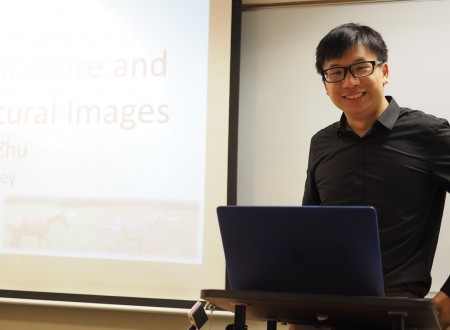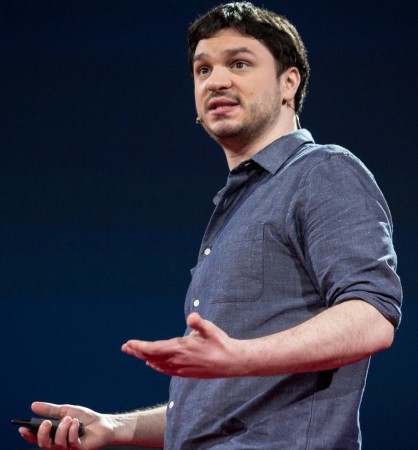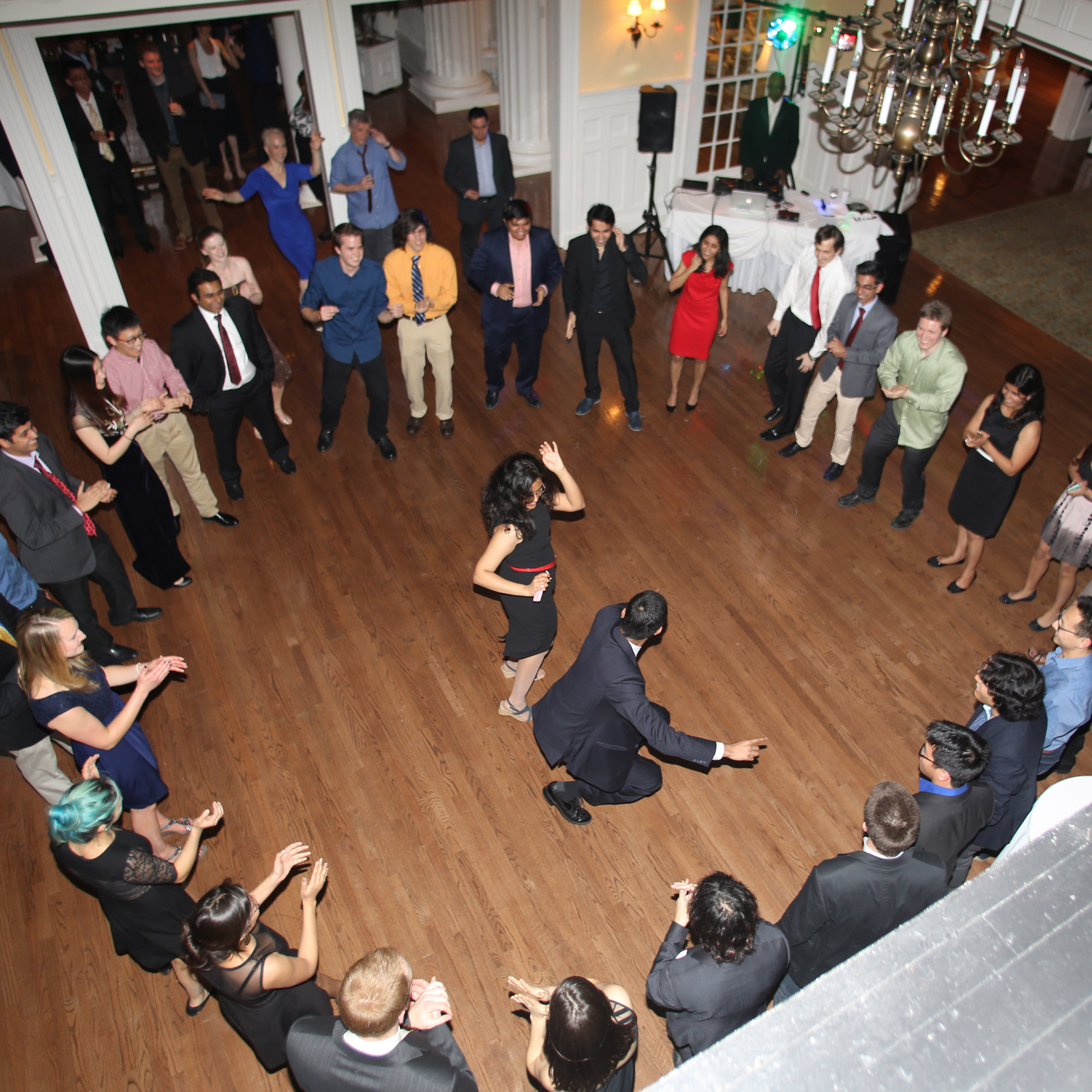Learning to see the physical world
Abstract: Human intelligence is beyond pattern recognition. From a single image, we're able to explain what we see, reconstruct the scene in 3D, predict what's going to happen, and plan our actions accordingly. In this talk, I will present our recent work on physical scene understanding---building versatile, data-efficient, and generalizable machines that learn to see, reason about, and interact [...]
Learning to Synthesize Images
Abstract: People are avid consumers of visual content. Every day, we watch videos, play games, and share photos on social media. However, there is an asymmetry – while everybody is able to consume visual content, only a chosen few (e.g., painters, sculptors, film directors) are talented enough to express themselves visually. For example, in modern [...]
Carnegie Mellon University
Direct Drive Hands: Force-Motion Transparency in Gripper Design
Abstract: The Direct Drive Hand (DDHand) project is exploring a new design philosophy for grippers. The conventional approach is to prioritize clamping force, leading to high gear ratios, slow motion, and poor transmission of force/motion signals. Instead, the DDHand prioritizes transparency: we view the gripper as a signal transmission channel, and seek high-bandwidth, high-fidelity transmission [...]
Faculty Candidate: Angjoo Kanazawa
Title: Perceiving Humans in the 3D World Abstract: Since the dawn of civilization, we have functioned in a social environment where we spend our days interacting with other humans. As we approach a society where intelligent systems and humans coexist, these systems must also interpret and interact with humans that reside in the 3D world. [...]
Three surprises and a story of prison education
Abstract: I will talk about three results that surprised me. First, I will show that the free configuration space of an elastic wire is path-connected, a result that makes easy a manipulation planning problem that was thought to be hard. Second, I will show a linear relationship between stimulation parameters, skin impedance, and sensation intensity [...]
Augmenting Imagination: Capturing, Modeling, and Exploring the World Through Video
Abstract: Cameras offer a rich and ubiquitous source of data about the world around us, providing many opportunities to explore new computational approaches to real-world problems. In this talk, I will show how insights from art, science, and engineering can help us connect progress in visual computing with typically non-visual problems in other domains, allowing [...]
Carnegie Mellon University
Terrain Relative Navigation for Lunar Polar Roving: Exploiting Geometry, Shadows, and Planning
Abstract: Water ice at the lunar poles could be the most valuable resource beyond planet Earth. However, that value is not foregone, and can only be determined by rovers that evaluate the distributions of abundance, concentration, and characteristics of this ice. The near-term explorations will be solar and unlikely to endure night, and hence are [...]
AI-Driven Videos Synthesis and its Implications
Abstract: In this talk, I will present my research vision in how to create photo-realistic digital replica of the real world, and how to make holograms become a reality. Eventually, I would like to see photos and videos evolve to become interactive, holographic content indistinguishable from the real world. Imagine taking such 3D photos to [...]
Carnegie Mellon University
Toward intuitive human controlled MAVs: motion primitives based teleoperation
Abstract: Humans excel at composing high-level plans that achieve a complex, multimodal objective; however, achieving proficiency in teleoperating multi-rotor aerial vehicles (MAVs) in unstructured environments with stability and safety requires significant skill and training. In this talk, we present human-in-the-loop control of a MAV via teleoperation using motion primitives that addresses these concerns. We show [...]
Understanding 3D Scans
Abstract: With recent developments in both commodity range sensors as well as mixed reality devices, capturing and creating 3D models of the world around us has become increasingly important. As the world around us lives in a three-dimensional space, such 3D models will not only facilitate capture and display for content creation but also provide [...]
Robots Learning from Human Teachers
Abstract: In this talk I will cover some of the recent work out of the Socially Intelligent Machines Lab at UT Austin (http://sim.ece.utexas.edu/research.html). The vision of our research is to enable robots to function in dynamic human environments by allowing them to flexibly adapt their skill set via learning interactions with end-users. We explore the ways in which [...]
Carnegie Mellon University
Improving Multirotor Trajectory Tracking Performance using Learned Dynamics Models
Abstract: Multirotors and other aerial vehicles have recently seen a surge in popularity, partly due to a rise in industrial applications such as inspection, surveillance, exploration, package delivery, cinematography, and others. Crucial to multirotors' successes in these applications, and enabling their suitability for other applications, is the ability to accurately track trajectories at high speed [...]
Carnegie Mellon University
Learning to Align without Geometric Supervision
Abstract: Extracting geometric information from image data is a highly nonlinear problem that exhibits in a number of visual recognition tasks such as object localization, facial landmark tracking and human pose estimation. Successful alignment across image data often serves as a crucial component in making them possible. In this talk, I will present how one [...]
Carnegie Mellon University
Hybrid Soft Sensing in Robotic Systems
Abstract: The increasing prevalence of wearable technology in our daily lives has created a demand for safe and robust sensing skins. Largely inspired by human skin, the ultimate goal of electronic skins is to measure diverse sensory information, conform to surfaces, and avoid interfering with the natural mechanics of the host or user. These demands [...]
Carnegie Mellon University
Automatic Real-time Anomaly Detection for Autonomous Aerial Vehicles
Abstract: The recent incidents with Boeing 737 Max 8 aircraft have raised concerns about the safety and reliability of autopilots and autonomous operations. There is a growing need for methods to monitor the status of aircraft and report any faults and anomalies to the human pilot or to the autopilot to deal with the emergency [...]
Creative Robots with Deep Reinforcement Learning
Recent advances in Deep Reinforcement Learning (DRL) algorithms provided us with the possibility of adding intelligence to robots. Recently, we have been applying a variety of DRL algorithms to the tasks that modern control theory may not be able to solve. We observed intriguing creativity from robots when they are constrained in reaching a certain [...]
2019 Robotics Institute Semi-formal
By invitation only: The 2019 Robotics Institute Semi-formal Robotics Institute members and a guest are invited to join us for our annual semi-formal! Join us for an evening of music, fun, food and friends! Food and beverage will include: hot hors d’oeuvres, stations for carving, pasta, fruit, cheese, coffee and dessert and hosted non-alcoholic beverages. [...]
Teruko Yata Memorial Lecture – Understanding Human Behavior for Robotic Assistance and Collaboration
Speaker: Henny Admoni, Assistant Professor, Robotics Institute Carnegie Mellon University Title: Understanding Human Behavior for Robotic Assistance and Collaboration . Human-robot collaboration has the potential to transform the way people work and live. Researchers are currently developing robots that assist people in public spaces, on the job, and in their homes. To be effective assistants, these robots [...]
2019 RI National Robotics Week Celebration
The Robotics Institute will celebrate the tenth annual National Robotics Week on April 11 & 12 with lectures, project demonstrations, the annual Mobot (mobile robot) races, and a reception for RI affiliated people. REGISTRATION IS NOW OPEN REGISTER HERE If you have any specific questions about the National Robotics Week open house please email Debbie [...]
Carnegie Mellon University
Towards Safe and Robust Behavior Mixing for Multi-Robot Systems
Abstract: Multi-robot systems have been widely studied for extending its capability of accomplishing complex tasks through cooperative behaviors. In large-scale multi-robot behavior mixing, the heterogeneous robotic team executes simultaneously multiple behaviors or sequences of behaviors with various task-prescribed controllers in real time to increase efficiency in parallel tasks. Key to the success of behavior mixing [...]
Carnegie Mellon University
Design and Evaluation of Robust Control Methods for Robotic Transfemoral Prostheses
Abstract: Amputees face a number of gait deficits due to a lack of control and power from their mechanically-passive prostheses. Of crucial importance among these deficits are those related to balance, as falls and a fear of falling can cause an avoidance of activity that leads to further debilitation. In this thesis, we investigate the [...]
Carnegie Mellon University
Vigneshram Krishnamoorthy – MSR Thesis Talk
Title: A Computational Framework for Norm-Aware Reasoning in Autonomous Systems Abstract: Autonomous agents are increasingly deployed in complex social environments where they not only have to reason about their domain goals but also about norms that can impose constraints on task performance. Integrating task planning with norm aware reasoning is a challenging problem due to [...]
Carnegie Mellon University
Deep Reinforcement Learning Representations for Robotics
Abstract: A long standing goal of robotics research is to create algorithms that can automatically learn complex control strategies from scratch. Part of the challenge of applying such algorithms to robots is the choice of representation. While RL algorithms have been successfully applied to many robotics tasks such as Ball-in-a-Cup and various RoboCup soccer domains, [...]
Carnegie Mellon University
Speeding Up Search-based Motion Planning Via Conservative Heuristics
Abstract: Weighted A* search (wA*) is a popular tool for robot motion-planning. Its efficiency however depends on the quality of heuristic function used. In fact, it has been shown that the correlation between the heuristic function and the true cost-to-goal significantly affects the efficiency of the search, when used with a large weight on the [...]
Carnegie Mellon University
Learning multi-robot behaviors for online control
Abstract: Finding dynamically feasible and safe global plans for multi-agent teams in real world applications is enormously difficult because the decision branching factor, when considering all possible interactions across agents and an environment, is usually intractable. Humans, however, have great success in the multi-agent planning domain by using behaviors: practiced, coordinated responses for groups of [...]
Carnegie Mellon University
Routing for Persistent Exploration in Dynamic Environments with Teams of Energy-Constrained Robots
Abstract: In domains requiring effective situational awareness with limited resources, prioritizing focus is critical. Search and rescue tasks require fast identification of safe avenues for rescuers to traverse the area. Inspection tasks must realize trends over long durations to identify issues caused by the confluence of high-stress modes that compound into catastrophic failure. Deploying robots [...]
Carnegie Mellon University
Intra-Robot Replanning and Learning for Multi-Robot Teams in Complex Dynamic Domains
Abstract: In complex dynamic multi-robot domains, there is a set of individual robots that must coordinate together through a centralized planner that inevitably makes assumptions based on a model of the environment and the actions of the individual. Eventually, the individuals may encounter failures, because the centralized planner’s models of the states and actions are [...]
Carnegie Mellon University
Toward a New Type of Agile and Dexterous Mobile Manipulator
Abstract: Mobile robot bases have been developed over many decades, but only recently have researchers added arms to these bases, opening up the rich field of mobile manipulation. Most of these robots either need wide, heavy, statically-stable bases that may or may not be omnidirectional to support the arms and provide stability. Such robot bases, [...]
Carnegie Mellon University
Light Sheet Depth Imaging
Abstract: Once confined to industrial manufacturing facilities and research labs, robots are increasingly entering everyday life. As specialized robots are developed for tasks such as autonomous driving, package delivery, and aerial videography, there is a growing need for affordable depth sensing technology. Robots use sensors like scanning LIDAR, depth cameras, and passive stereo cameras to [...]
Carnegie Mellon University
Towards Generalization and Efficiency in Reinforcement Learning
Abstract: In classic supervised machine learning, a learning agent behaves as a passive observer: it receives examples from some external environment which it has no control over and then makes predictions. Reinforcement Learning (RL), on the other hand, is fundamentally interactive: an autonomous agent must learn how to behave in an unknown and possibly hostile [...]
Carnegie Mellon University
Akshat Agarwal – MSR Thesis Talk
Title: Learning Transferable Cooperative Behavior in Multi-Agent Teams Abstract: We study the emergence of cooperative behavior and communication protocols in multi-agent teams, for collaboratively accomplishing tasks like coverage control and formation control for swarms. Using graph neural networks to model inter-agent communications, we present state-of-the-art results in a fully decentralized execution framework which assumes [...]
Carnegie Mellon University
Yifan Ding – MSR Thesis Talk
Title: Decentralized Multiple Mobile Depots Route Planning for Replenishing Persistent Surveillance Robots Abstract: Persistent surveillance of a target space using multiple robots has numerous applications. The continuous operation in these applications is challenged by the limited onboard battery capacity of the persistent robots. We consider the problem for replenishing persistent robots using mobile depots, [...]
Active Learning in Robot Motion Control
Abstract: Motion motivated by information needs can be found throughout natural systems, yet there is comparatively little work in robotics on analyzing and synthesizing motion for information. Instead, engineering analysis of robots and animal motion typically depends on defining objectives and rewards in terms of states and errors on states. This is how we formulate [...]
Carnegie Mellon University
Tanya Marwah – MSR Thesis Talk
Title: Generating 3D Human Animations from Single Monocular Images Abstract: Endowing AI systems with the ability to formulate a three-dimensional understanding of human appearance from a single RGB image is an important component technology for applications such as person re-identification, biometrics, virtual reality and augmented reality. However, jointly inferring the texture map and 3D [...]
Human-guided Task Transfer for Interactive Robots
Abstract: Adaptability is an essential skill in human cognition, enabling us to draw from our extensive, life-long experiences with various objects and tasks in order to address novel problems. To date, most robots do not have this kind of adaptability, and yet, as our expectations of robots’ interactive and assistive capacity grows, it will be [...]
Pragna Mannam – MSR Thesis Talk
Title: Model-free Sensorless Manipulation Abstract: This thesis is a study of 2D manipulation without sensing and planning, by exploring the effects of unplanned randomized action sequences on 2D object pose uncertainty. Our approach uses sensorless reorienting of an object to achieve a determined pose, regardless of the initial pose. Without using sensors and models [...]
Carnegie Mellon University
Gines Hidalgo Martinez – MSR Thesis Talk
Title: OpenPose: Whole-Body Pose Estimation Abstract: We present the first single-network approach for 2D whole-body (body, face, hand, and foot) pose estimation, capable of detecting an arbitrary number of people from in-the-wild images. Our method maintains constant real-time performance regardless of the number of people in the image. This network is trained in a [...]
RI Faculty Social
All Robotics Institute faculty are invited to attend this informal team-building business/social event. Beverages and snacks will be provided.
Donglai Xiang – MSR Thesis Talk
Title: Monocular Total Capture: Pose Face, Body, and Hands in the Wild Abstract: We present the first method to capture the 3D total motion of a target person from a monocular view input. Given an image or a monocular video, our method reconstructs the motion from body, face, and fingers represented by a 3D deformable [...]
Carnegie Mellon University
Wentao Yuan – MSR Thesis Talk
Title: 3D Shape Completion and Canonical Pose Estimation with Structured Neural Networks Abstract: 3D point cloud is an efficient and flexible representation of 3D structures and the raw output of many 3D sensors. Recently, neural networks operating on point clouds have shown superior performance on various 3D understanding tasks, thanks to their power to [...]
Carnegie Mellon University
Planning under Uncertainty with Multiple Heuristics
Abstract: Many robotic tasks, such as mobile manipulation, often require interaction with unstructured environments and are subject to imperfect sensing and actuation. This brings substantial uncertainty into the problems. Reasoning under this uncertainty can provide higher level of robustness but is computationally significantly more challenging. More specifically, sequential decision making under motion and sensing uncertainty [...]
Rawal Khirodkar – MSR Thesis Talk
Title: Leveraging Simulation for Computer Vision Abstract: A large amount of labeled data is required to train deep neural networks. The process of data annotation on such a large scale is expensive and time-consuming. A promising alternative in this regard is to use simulation to generate labeled synthetic data. However, a network trained solely [...]
Carnegie Mellon University
Dexterous Manipulation via Simple Robot Hands
Abstract: Most of the industrial robotic applications nowadays can only deal with pick-and-place manipulation, in which fixed graspings are the only interactions between the object and the robot hand. Simple hands, such as pinch grippers and suction cups, suffice to accomplish such tasks. However, there exist many unsolved automation problems where more dexterous manipulations are [...]
Carnegie Mellon University
Maximilian Sieb – MSR Thesis Talk
Title: Visual Imitation Learning for Robot Manipulation Abstract: Imitation learning has been successfully applied to solve a variety of tasks in complex domains where an explicit reward function is not available. However, most imitation learning methods require access to the robot's actions during demonstration. This stands in a stark contrast to how we [...]
Carnegie Mellon University
Enabling Role-Reversible Human-Robot Interaction by Leveraging Standardized Tools for Provider-Receiver Interactions
Abstract: Developing 'social intelligence' for assistive robots to seamlessly interact with humans remains an open research challenge. However, socially assistive robots typically engage in types of interactions that already exist between humans, which makes models of human-human interactions useful to inform the design of robot social behaviors. In particular, in applications such as healthcare, therapy [...]
Carnegie Mellon University
Nikhil Jog – MSR Thesis Talk
Title: Highly Miniaturized Robots for Inspection of Small Nuclear Piping Abstract: Bomb making in the 20th century resulted in the creation of massive facilities to produce Uranium. As part of a multi-billion-dollar agenda, the measurement of radioactivity is required for the safe disposal of residual Uranium in piping. Manual techniques have proven too approximate, [...]
Carnegie Mellon University
Contrastive View Predictive Learning with 3D-Bottlenecked RNNs
Abstract: In this talk, I will describe our recent work on neural architectures for visual recognition, which use 3D not as input nor as the desired output space, but rather as the bottleneck of the learned representations. We consider embodied agents moving in otherwise static worlds equipped with these architectures; they learn 3D visual feature [...]
Chao Cao – MSR Thesis Talk
Title: Topological Path Planning for Mobile Robot Applications Abstract: Many path planning problems in mobile robot applications can be solved more efficiently in the topological space. By using the language of topology, the richer spatial information failed to captured by graph/grid-based map representations can be explicitly expressed and exploited. With that, it is possible [...]
Carnegie Mellon University
MSR Thesis Talk – Tao Chen
Title: Deep Reinforcement Learning with Prior Knowledge Abstract: Deep reinforcement learning has been applied to many domains from computer games, natural language processing, recommendation systems to robotics. While model-free reinforcement learning algorithms are promising approaches to learning policies without knowledge of the system dynamics, they usually require much more data. In this thesis, we [...]
Carnegie Mellon University
Towards Understanding and Mitigating Biases
Abstract: There are many problems in real life that involve collecting and aggregating evaluation from people, such as conference peer review and peer grading. In this thesis, we consider multiple sources of biases that may arise in this process: (1) human bias -- the data collected from people are noisy and reflect people's calibration criteria [...]
Toward Intent Recognition through Nonverbal Behaviors in Assistive Co-Manipulation
Abstract: Robots are becoming more versatile, increasing the available opportunities to use them in situations that aid people in everyday tasks. For example, recent research has investigated robot manipulators for assisting people with motor impairments in activities of daily living such as eating a meal. To form successful collaborations in these interactions, researchers need to [...]
Carnegie Mellon University
Anqi Yang – MSR Thesis Talk
Title: 3D Object Detection from CT Scans using a Slice-and-fuse Approach Abstract: Automatic object detection in 3D X-ray Computed Tomography imagery has recently gained research attention due to its promising applications in aviation baggage screening. The huge dimension of an individual 3D scan, however, poses formidable computational challenges when coupled with deep 3D convolutional [...]


















































